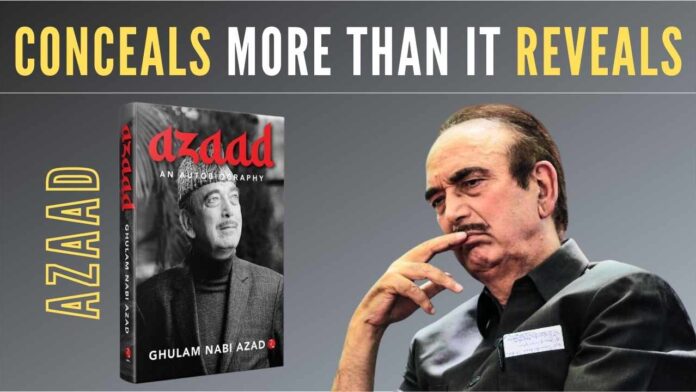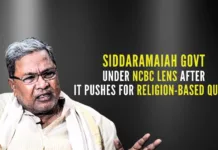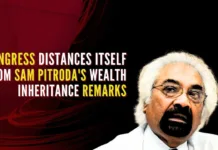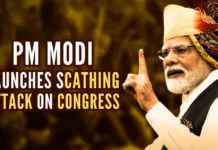
The book omits all of Azad’s unpardonable sins
Former Congress leader Ghulam Nabi Azad’s “Azaad: An Autobiography” hit the stands on April 6. I got it through Flipkart on April 11. In between, I read three reviews – ‘Azad’s veiled comments on Sonia Gandhi’ by leading journalist Rajesh Singh[1], ‘Azaad: An Insider Speaks Out’ by another leading journalist Priya Sehgal [2], and “Azad goes beyond targeting Rahul Gandhi’ by a keen Congress-watcher Rasheed Kidwai [3]. All three wrote on what Azad, who remained associated with Congress for almost 50 years and enjoyed loaves and fishes of office for nearly 30 years, said about the Congress, its rise and great fall, and its future.
Partly right, partly wrong
However, none of the three thought it politically prudent to review the role of Azad as J&K CM (Nov 2, 2005-July 7, 2008). All three reviews gave me to understand that Azad’s autobiography was nothing but a history of the Congress, party politics within the Congress, the power struggle within the Congress, and the history of the Congress and its decline. This author had no other option except to draw a conclusion as I drew.
I was partly right and partly wrong. Right because none of the three reviewers had written a single word on Azad as J&K CM and wrong because I drew a conclusion without going through the so-called autobiography – so-called because it’s one-sided, highly biased and intellectually dishonest and it conceals more than it reveals as far as his role as J&K CM was concerned.
Subverting polity from within
Azad pats his back while talking about the constitution of five working groups on J&K by PM Manmohan Singh in February 2006 and the three roundtable conferences (RTC) on J&K held, including the third RTC held at the PM”s official residence on April 24, 2007. He claims that the fallout of what transpired during these RTCs was the decision of the Manmohan Singh-led UPA government to announce a special package for the migrated-from-the-Valley “Kashmiri pundits” in April 2008 at Akhnoor. Under the “Special Package”, 1,024 two-room tenements were to be constructed in the Jammu district (in Nagrota, Purkhoo, and Muthi). Yes, a special package was announced, but only in 2008.
Azad should have told the nation what transpired under the chairmanship of the PM in the third RTC as far as J&K’s political future was concerned. He was anchoring the proceedings. What happened? Emboldened by the PM’s statement that “there’s the need to evolve a consensus on the twin issues of self-rule and autonomy for J&K”, the ardent believers in the concept of Kashmiri Muslim sub-nationalism, including NC president and former J&K CM Farooq Abdullah, batted for a regime that would further widen the already rather wide gulf between J&K and New Delhi. This author, who was also a delegate, listened to them patiently and didn’t even once retort. I spoke only when my turn came.
The moment I started calling the bluff of Azad or reflecting on the sins he committed as CM as well as the unsettling statements made, the protagonists of greater autonomy, bordering on virtual sovereignty, including Farooq Abdullah and his son Omar Abdullah, pounced upon me. They were not allowing me to speak. I told them, “When you spoke, I listened; now listen to what I have to say”. What was shocking was that delegates from Jammu, Mangat Ram Sharma (Congress), and Bhim Singh (Panthers Party) joined hands with Farooq Abdullah and ilk. Bhim Singh even went to the extent of opposing me and joining hands with them, saying “Farooq Sahib aap aage badho, hum aap ke saath hain, Azad Shaib aap aage badho, hum aap ke saath hain, Mufti Sahib aap aage badho, hum aap ke saath hain”. But their tirade failed to deter me. I wanted to speak and expose them to the extent I could. And I did. (As we proceeded for lunch, Mangat Ram Sharma came to me and told: “Professor Sahib, aisa kara padta hai” and Farooq Abdullah told me that “I retorted and attacked you because things would turn very difficult, had I not done what I did”.
The lead editorial in The Hindu (Apr 28, 2007) — ‘Case for consensus’ and the lead article, ‘The bits and pieces of a consensus’ by Praveen Swami – wrote on the role I played in the third RTC[4].
No wonder then that Azad’s so-called autobiography is completely silent on the unpardonable sins he committed. It would be only desirable to describe all of them, but very briefly.
On March 29, 2006, he openly and publicly vouched for a regime under which there could be joint control of India and Pakistan over J&K’s waters, power projects, agriculture, sericulture, forestry, environment, and tourism”.
On February 9, 2007, the Azad government framed rules and regulations under the pernicious Farooq Abdullah’s Roshni Act of 2001 to enable his co-religionists and others to loot and plunder more than 24 lahks kanal state land, mostly in Jammu, and cause a loss to the J&K exchequer to the tune of Rs.25,000 crore. The Comptroller & Auditor-General (C&AG) described what Azad did as the “biggest land scam in J&K” and J&K High Court declared the Act “illegal and unconstitutional”. He changed Jammu’s demography to the maximum extent. Believe it or not, but it is a fact that he has not referred to the Roshni Act even once.
Of course, he has written on land policy, which has all the potential of misleading the nation and which seeks to show that he was against land grabbers. Just look at page number 222. He writes: “It was during my period in March 2006 that a government official brought to me a file for my signature. It proposed the construction of private houses in the form of an officers’ colony on government land located on a hillock near Chashme Shahi (Srinagar, Kashmir). Needless to say, the land would be parceled out at very concessional rates or no rate at all. I found the proposal fishy since I had already taken huge steps to retrieve government land from the illegal occupation of leaders and bureaucrats in Srinagar. I read the file carefully; in any case, I never cleared files without reading them thoroughly. It took me no time to realize that my signature would sanction an official kabza (encroachment) of prime government land”.
In March 2007, Azad rejected outright Bills on “secularism”, “socialism” and “national Flag”.
On February 9, 2007, his government rejected a Bill seeking the protection and preservation of Hindu temples and shrines in Kashmir.
On February 2, 2007, his government passed the “Shariat Bill” moved by the National Conference of Farooq Abdullah and Omar Abdullah. No Kashmiri CM, not even Sheikh Abdullah, Mufti Sayeed, and Mehbooba Mufti, ever dared to pass a Bill that would apply Shari laws in J&K, but the Azad-led Congress-PDP coalition government did it, and with utmost ease.
The same month, the Azad government rejected the Bill seeking citizenship rights for the Hindu-Sikh refugees from Pakistan languishing in Jammu since their migration in 1947.
On February 6, 2007, his government plus the NC, the PDP, and all Kashmiri lawmakers, rejected the Bill that sought 50 percent representation for the under-represented Jammu province in the J&K Legislative Assembly. Instead, he came out with a formula that was aimed at creating more Assembly seats in the already over-represented Kashmir. He suggested a 25 percent increase in the Assembly seats in Jammu province and Kashmir province but failed.
New districts: Jammu betrayed
Azad again pats his back by asserting that it was he, and not Sheikh Abdullah, Farooq Abdullah, GM Shah, and Mufti Sayeed, who did justice to Jammu in July 2006 by creating new districts. But he suppresses the fact that he applied the 1983 Wazir Commission Report on districts in the wrong way to further hurt Jammu province and benefit Kashmir to which he belonged. He created four new districts in Kashmir, as against one recommended by the Commission, and an equal number of new districts in Jammu province, as against three recommended by the Commission. When the people of Jammu lambasted him for what he did, Azad said: “I believe in the principle of justice and equity”.
And, he said so while admitting that it was Jammu province that was gripped by the movement aimed at getting three new districts as Jammu province was two-time that of Kashmir, and the bulk of its terrain was difficult, treacherous, and inaccessible. In his autobiography, he acknowledges that the movement for new districts in Jammu’s Reasi and Kishtwar led by Rishi Kumar Kaushal and others “continued for few months” and “three students were killed in firing” and that there was no demand whatsoever anywhere in Kashmir for the creation of new districts. This was his concept of justice and equity.
Amarnath land row
On May 26, 2008, the Azad government transferred 99 acres of land at Baltal (Kashmir) to Shri Amarnath Shrine Board for “setting up temporary shelters and facilities for Hindu pilgrims visiting the shrine”. It transferred the land under the unequivocal directions given by the J&K High Court. The decision irked his coalition partners, the PDP, and other radical Islamists in Kashmir. They opposed the decision. The PDP even withdrew its support to the government. NC MP Omar Abdullah went to the extent of saying on the floor of the Lok Sabha that “the land belongs to us; we will not give an inch of land to the Shrine Board”.
To retain his chair, Azad, the state governor N N Vohra, and the Manmohan Singh government hatched a conspiracy against the devotees of Bhagwan Shiva and he snatched the land from the Shrine Board violating the High Court’s directions. Not only this, Azad taunted the Hindus by asking them to celebrate this decision by “distributing Ladoos”. The result was a mass movement in Jammu province and Azad’s government fell on July 8, 2008, under pressure from below in Jammu. The movement continued for more than two months. Over a dozen Amarnath devotees were shot dead. Jammu remained under curfew for almost 50 days. Everything came to stand still in Jammu province.
The Amarnath land movement could be described as the mother of all movements in the world as more than nine lakh Hindus, including women and children, courted arrest in just three days. But Azad’s autobiography is silent on all that this author writes in this review. Of course, he writes “violent protests broke out in the Kashmir Valley”.
A white lie
Azad claims that he didn’t try to win over MLAs to retain control over the CM chair. “I have always been against jod-tod (make-and-break) politics,” he says. It’s a spurious claim. The fact of the matter is that the Panthers Party with four MLAs from Jammu, which had, like the PDP, withdrawn its support to his government, had reassured Azad that its four MLAs would support the motion he would move in the Assembly on July 8 seeking the vote of confidence or to prove his majority. But on D-day, the Panthers Party MLAs didn’t support his government and it fell. Azad announced his resignation on the floor of the house.
But these are only a few of the several such instances which do not find a place in his autobiography for reasons not really difficult to fathom. In sum, it can be said that Azad has omitted everything from his autobiography which would expose him and his ideology and writes everything that would present him to the nation as a great, exceptionally honest, ultra-secular, and genuinely democratic leader and a great administrator. Mischievous is his approach. To call what he wrote an autobiography would be a misnomer.
Note:
1. Text in Blue points to additional data on the topic.
2. The views expressed here are those of the author and do not necessarily represent or reflect the views of PGurus.
Reference:
[1] Azad’s veiled comments on Sonia Gandhi – Apr 07, 2023, PGurus.com
[2] AZAAD: AN INSIDER SPEAKS OUT – Apr 08, 2023, The Sunday Guardian
[3] Ghulam Nabi Azad’s autobiography ‘Azaad’ goes much beyond targeting Rahul Gandhi – Apr 10, 2023, News 18
[4] Bits of consensus – May 18, 2007, The Hindu
PGurus is now on Telegram. Click here to join our channel and stay updated with all the latest news and views
For all the latest updates, download PGurus App.
- ‘Kashmir My core constituency’: Revisiting July 12, 2003 to understand politics, Omar Abdullah-style - March 15, 2024
- Total deviation from traditional approach: Seven takeaways from PM Modi’s March 7 Srinagar visit - March 9, 2024
- Status of political parties: Why is further J&K reorganization imperative? - March 1, 2024











Thanks Hari sir for exposing thins plain clothed jihadi sympathizer. More power to you. You should write a book exposing this crook called Azad.